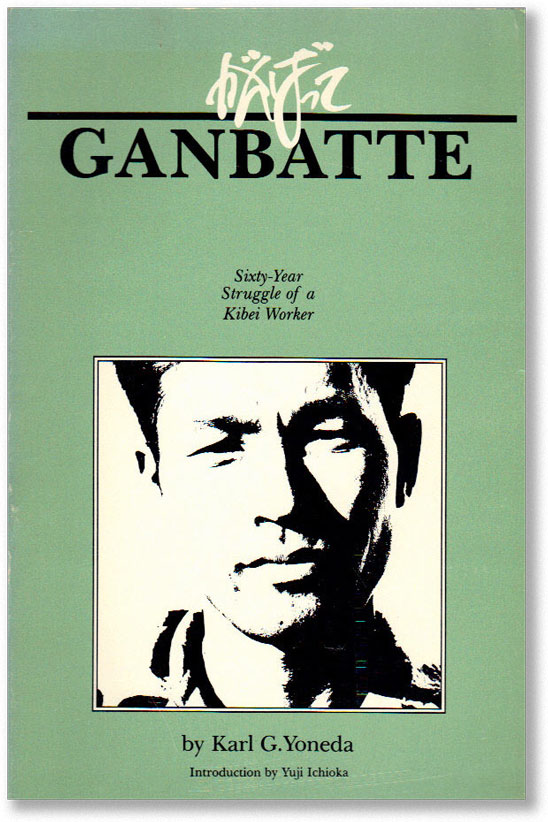Ganbatte: Sixty-year Struggle of a Kibei Worker (book)
Creators: Karl G. Yoneda

Book cover. Courtesy of the Asian American Studies Center, University of California
View in the Densho Encyclopedia
Kibei - Nisei labor organizer and communist shares his life story, including his unique experiences during World War II as the husband of a white woman with a mixed-race child incarcerated while he served with the Military Intelligence Service in the Pacific Theater.
Synopsis
Karl Yoneda begins his memoir with recollections of his childhood, from his earliest years in California to his schooling in Hiroshima Prefecture. He developed his interest in politics and activism while still a teenager, and even traveled to China to meet a Russian writer he admired. He returned to California as a young man to avoid being conscripted into what he called the imperialist army of Japan. His account of the prewar period focuses on his increasing involvement with labor organizing, his meeting with Elaine Black who eventually became his wife and lifelong partner in activism, and his efforts to improve workers' conditions while also denouncing what he considered oppressive and unjust policies both at home and abroad.
With Japan's attack on Pearl Harbor, Yoneda shifted his focus to defeating Japan, which he considered to be an oppressive and fascist regime. He attempted to enlist in the Army immediately, but was turned down. While he questioned the prejudice Japanese Americans faced, even within the Communist Party, he considered the cause of defeating imperialism and fascism more important, and threw himself into supporting the war effort however he could. He was among the volunteers who went to Manzanar to help with construction, and when recruiters for the Military Intelligence Service (MIS) visited Manzanar, he volunteered immediately. He also faced criticism and threats from groups within Manzanar who advocated pro-Japan sentiments. He served in the MIS for two years, mostly in the China-Burma-India Theater, where he wrote propaganda leaflets directed at Japanese soldiers.
In the postwar section of the memoir, Yoneda describes his involvement in different movements, from continued labor organizing and his publications recording the history of Japanese American labor, to civil rights, anti-nuclear protests, and efforts at international cooperation in activism.
Author Background
Karl Yoneda is perhaps the best-known and most important Japanese American labor organizer and Communist of the twentieth century. He authored numerous other works, mostly in Japanese, and in addition to his position as editor of various Japanese-language Communist and left newspapers before World War II, he was a frequent contributor to Akahata , the Japanese Communist Party's newspaper. His personal papers are part of the Japanese American Research Project collection in the Special Collections at UCLA Library.
Find in the Digital Library of Japanese American Incarceration
Ganbatte: Sixty-year Struggle of a Kibei Worker
This item has been made freely available in the Digital Library of Japanese American Incarceration , a collaborative project with Internet Archive .
Might also like
From Kona to Yen'an: The Political Memoirs of Koji Ariyoshi
by Koji Ariyoshi;
Birth of an Activist: The Sox Kitashima Story
by Tsuyako Kitashima;
Passing It On: A Memoir
by Yuri Kochiyama
| Author | Karl G. Yoneda |
|---|---|
| Pages | 244 |
| Publication Date | 1983 |
For More Information
Bishop, Katherine. " Elaine Black Yoneda, 81, Radical Labor Activist ." New York Times , May 30, 1988.
Nakao, Annie. " Labor and social activist Yoneda ." SF Gate, May 14, 1999.
Karl Yoneda Papers at UCLA Special Collections, Charles E. Young Research Library
Reviews
Daniels, Roger. Pacific Historical Review 54.3 (Aug 1985): 379-80.
Hane, Mikiso. Western Historical Quarterly 17.1 (Jan 1986): 95-96. ["This is an aspect of Japanese-American life that is little known: the life of a man who dedicated himself to fight for social justice through the vehicle of the Communist party."]
Parson, Michael D. Labor Studies Journal (Fall 1987): 86-87.